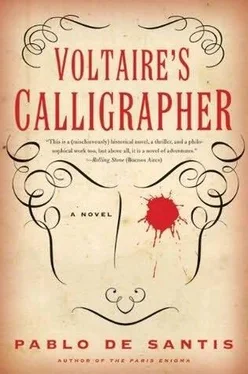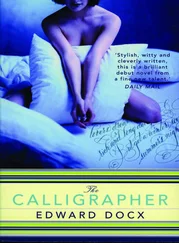Only Mathilde still threatened my calligraphy. I envied the men she was sent to, who would watch her undress and read the message, late at night, next to a fire. I spent much more time with her than they did, but the fact that she wasn’t addressed to me put her out of my reach.
Dussel, a calligrapher from Leipzig, was even more obsessed with Mathilde. He had come to Paris after fleeing his native city, where he was wanted for destroying a printing house. Dussel had belonged to the Hammers of God, a sect that believed the printing press would prevent man from ever discovering the original language, prior to Babel. They saw the printed word as the true Tower of Babel and, using calculations that were incomprehensible to anyone else, established similarities between the types of lead used in printing and the elements the Bible said were used to build the tower.
Mathilde’s nakedness was more unsettling to Dussel because he pretended to be pure, while I couldn’t have cared less about purity. Mathilde enjoyed this power and used conversation to try and distract him from his perfectly uniform letters. No matter how tense Dussel was when he wrote (and he was often so tense he would fall unconscious when a job was done), he never made a mistake.
Dussel would avoid writing on Mathilde’s most secret places, condensing his script so as to finish before the work became unbearably indecent. Mathilde would shift imperceptibly, to force him to use more space, but he never crossed the line he had set for himself. From the office next door, I heard Mathilde issue him an even greater challenge: since the Bible was the only book young Siccard deemed edifying enough to leave in the offices, could Dussel transcribe the entire New Testament on her body?
Aristide Siccard trusted Dussel, paying him double what he paid me, even though he was no better. In Siccard’s mind, unhappiness was sensible, obsession responsible, and misery virtuous.
I had worked long enough now to report to Abbot I Mazy and provide a little false information for a bit of real money. Not one of the messages I had transcribed spoke of the bishop, but as I walked to see the abbot, I invented the words that faraway men had exchanged under cover of anonymity, women, and the night. I crossed palace halls, descended into cellars, and climbed a dank tower, patiently following directions from monks who had just seen the abbot cross palace halls, descend into cellars, and climb a dank tower. After searching for hours, exhausted, I came to a corridor. Mazy was walking toward me, his white cassock dragging on the ground.
The abbot looked at me as if he’d never seen me before. I imagined he must have spies everywhere, and it would therefore be hard to remember all of their names and faces. I told him there was talk of the bishop’s abduction, even his death, and that the rumors were insistent.
“Do they mention proof or witnesses?”
“No, Monsignor.”
“Fantasy and rumor are sins the Church has not condemned enough,” Mazy said. “Come with me and I’ll show you the bishop is alive.”
We walked down the corridor; leaves and rain blew in through the open windows. Down below was a geometric garden, where plants and shrubs surrounded deep ponds made of black stone. I asked the abbot whether they raised fish.
“There are some sea creatures that we use to make ink, which we then sell abroad. Darel advised us in this undertaking. Our botany is inspired by calligraphy as well. No strangers are allowed to walk through the garden because of all the thorns and poisons in the species we cultivate. Everything we use to write with can also be used to kill.”
We were approaching a carved door. It was being guarded by a giant of a man with hundreds of keys hanging from the belt of his green uniform. Seeing us, he nodded respectfully to Abbot Mazy and stepped aside. This set his keys jangling, like bells calling the faithful to mass.
“Signac holds all of the keys to the palace. We’ve tried to convince him to leave them behind, but he takes them wherever he goes. I trust no one more than good Signac. He’s always right where you need him, to open a door or close it forever.”
The guard reached into an inside pocket and pulled out a key tied with a red ribbon, then turned it in the lock.
“The bishop was gravely ill,” the abbot explained. “When we thought he was about to die, he had a revelation: he would be saved if he took a vow of silence. The Church was forced to renounce his voice, just when it needed it most. Since then, he has only ever communicated in writing.”
“And how long is this silence to last?”
“Until the final silence.”
Mazy opened the door onto a room made of white marble. I stood in the doorway, not daring to approach the man at the desk. He was leaning over a piece of paper, holding a pen with difficulty, as if it were intolerably heavy. I couldn’t see his face. The marble everywhere was like a prelude to the tomb. It was so cold and so white, even in the semi-darkness, that it resembled a grotto carved out of ice.
The abbot pulled back the gray drapes. Light cut a swath through the clouds and stained-glass windows, illuminating the paper. The bishop dipped his pen in the inkwell and wrote a few letters stripped of any adornment. He wrote slowly, as if all action consisted of a series of inactions.
Everything was completely still, except for the bishop’s unhurried hand.
The abbot asked me whether the bishop was alive. It was then I understood this was a test and that Mazy needed others to see what he saw. The bishop looked like a living corpse, but it was true he did move, and even more true that a reply in the negative would not please Mazy.
Without knowing if it was the truth or a lie, I replied:
“The bishop lives.”
Hunched over, the bishop’s face was still obscured. Watching people write is always a bit mysterious, as they speak of things we can’t see. The abbot gestured for me to leave and pulled the drapes closed, like a curtain coming down on the final act. Seemingly indifferent to the dark and to the performance that had ended, the bishop continued to write.
After Arnim Palace, I went to the courts to ask for Kolm, but no information was provided about executioners for fear of revenge. When I insisted, they let me leave a message in a basket. The note, proposing we meet the next day, fell in among others that looked as if they had been there for years, waiting for someone who never came. A rope was lowered down, and the basket was hung on a hook. The messages soon rose up until they disappeared into one of the upper windows.
I waited for the executioner in front of the courthouse the following day. Suddenly, I felt hands around my neck, and my feet left the ground once again. As I fought for air and recovered from his little joke, Kolm told me that someone from the hanged man’s troupe in Toulouse had insisted on accusing him. The law had more to worry about than an actor who had taken his role too far, but he had nevertheless decided to leave as a precaution.
The walking stick with the metal fist still hung off his belt. I asked whether it continued to malfunction.
“It destroys everything it touches.”
“I know someone who can fix it.”
“I’m used to it now.”
I insisted; I didn’t want to look for Von Knepper on my own.
We walked around behind a church and into a deserted cul-de-sac until we reached a green door. The owner’s name-Laghi-was engraved on the lintel. A carriage clock was visible through the window; on top of the wooden base, a Vulcan was about to let his hammer fall on an anvil. I pulled the bell, but no one came. Kolm pounded impatiently on the door.
Читать дальше
Конец ознакомительного отрывка
Купить книгу












